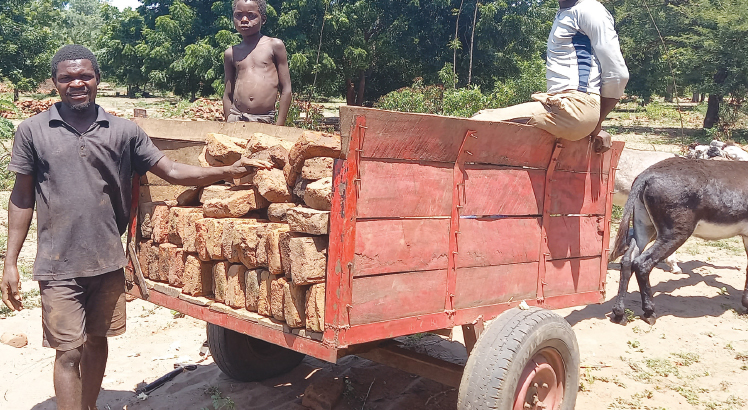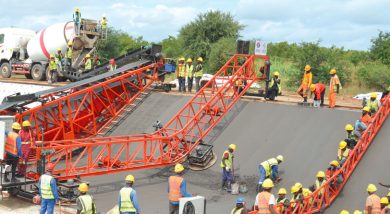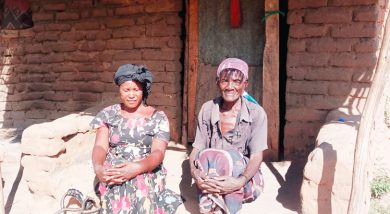Slow rise from Storm Ana
Henry Nsinjo, 22, is struggling to rebuild his house and replant nearly two months after being left homeless by floods.
He is one of about 420 500 people from 84 106 families affected by Cyclone Ana in Chikwawa District.
Shortly after the tropical storm struck part of the southern Region, the young man lost nearly everything he had accumulated for almost seven years since he left his parents’ home.
“My house and everything in it were destroyed by flash floods. Food, clothes, fertiliser and even the money.
Everything is gone,” he recalls.

Nsinjo, who quit schooling in Standard Five, heads one of the worst hit families in Kalima Village located about seven kilometres southwest of Beleu Trading Centre in Traditional Authority (T/A) Maseya.
He still does not understand how his two donkeys and an oxcart survived the disasters that affected about 900 000 in 17 districts.
“The donkeys were on the cusp of dying as they were submerged in floodwater. They went three days without food,” he recalls. “I didn’t expect them to be alive after being trapped in the mud for days.”
The surviving donkeys and cart have become handy in helping her bounce back better.
He charges a few for carrying goods of people currently moving upland from 16 villages in the devastated floodplain.
“The work is huge, but the workers are few,” says the father of one, cashing in on the belated escape from the disaster-prone lowlands.
Nsinjo’s donkey-drawn cart has been hauling goods from lowlands every day for a month.
“I charge K250 per trip and sometimes make about K10 000 a day as most villagers are moving bricks from their shattered houses to Kalima Evacuation Camp where they are constructing temporary shelters,” he explains.
Brick by brick, a new settlement is taking shape in Kalima Village, where floods reduced about six in every 10 houses to rubble.
Group village head Kalima says only 43 of 606 houses in his area are still standing.
“About 360 houses completely collapsed,” he said.
The village suffered a similar devastation in January 2015 as well as during Cyclone Idai in March 2019.
However, the locals say Ana was the most devastating of them all.
“This year’s disaster left indelible marks in the village,” Kalima explains. “Nearly the entire village was swept away, including livestock. We were just lucky not to lose any life here.”
The aged traditional leader, now in his 90s, said the displaced community is facing numerous challenges such as shortage of food, shelter, blankets and learning materials.
Recently, Good Neighbours Malawi distributed fortified maize flour, water buckets and blankets to about 1 100 families at Kalima and Chagambatuka camps near Bereu.
The charity also donated 25 200 exercise to children at Kalima, Chagambatuka and Beleu primary schools.
Good Neighbours Malawi country director Gyo Jin Joo estimated the value of the donation was K50 million.
He noted that the learners hit hard by Cyclone Ana run the risk of being left behind as most humanitarian organisations are focusing on food aid and needs.
“We want these learners to continue learning despite being affected by these natural disasters,” said Jin Joo.
The Department of Disaster Management Affairs (Dodma) reports that the tropical storm affected 995 072 people from 221 127 households in 18 districts. At least 46 people were confirmed dead, 206 injured and 28 still missing.
Kalima residents mirror the plight of about 190 500 displaced people who sought shelter in 178 emergency evacuation camps.
Storm Ana affected 398 908 learners from 476 schools, reports Dodma.
Its rapid assessments shows that about 106 700 families lost about 115 388 hectares of crops and 51 023 livestock, with Chikwawa being the hardest hit.
Dodma requires about K72.6 billion to lessen the hardship of Cyclone Ana survivors, but had a deficit of about K68.9 billion as of February 14.
Charles Kalemba, the commissioner of Dodma, ramped up calls for both internal and external assistance to boost the country’s relief efforts.





